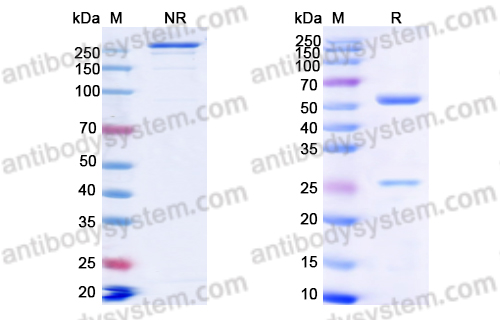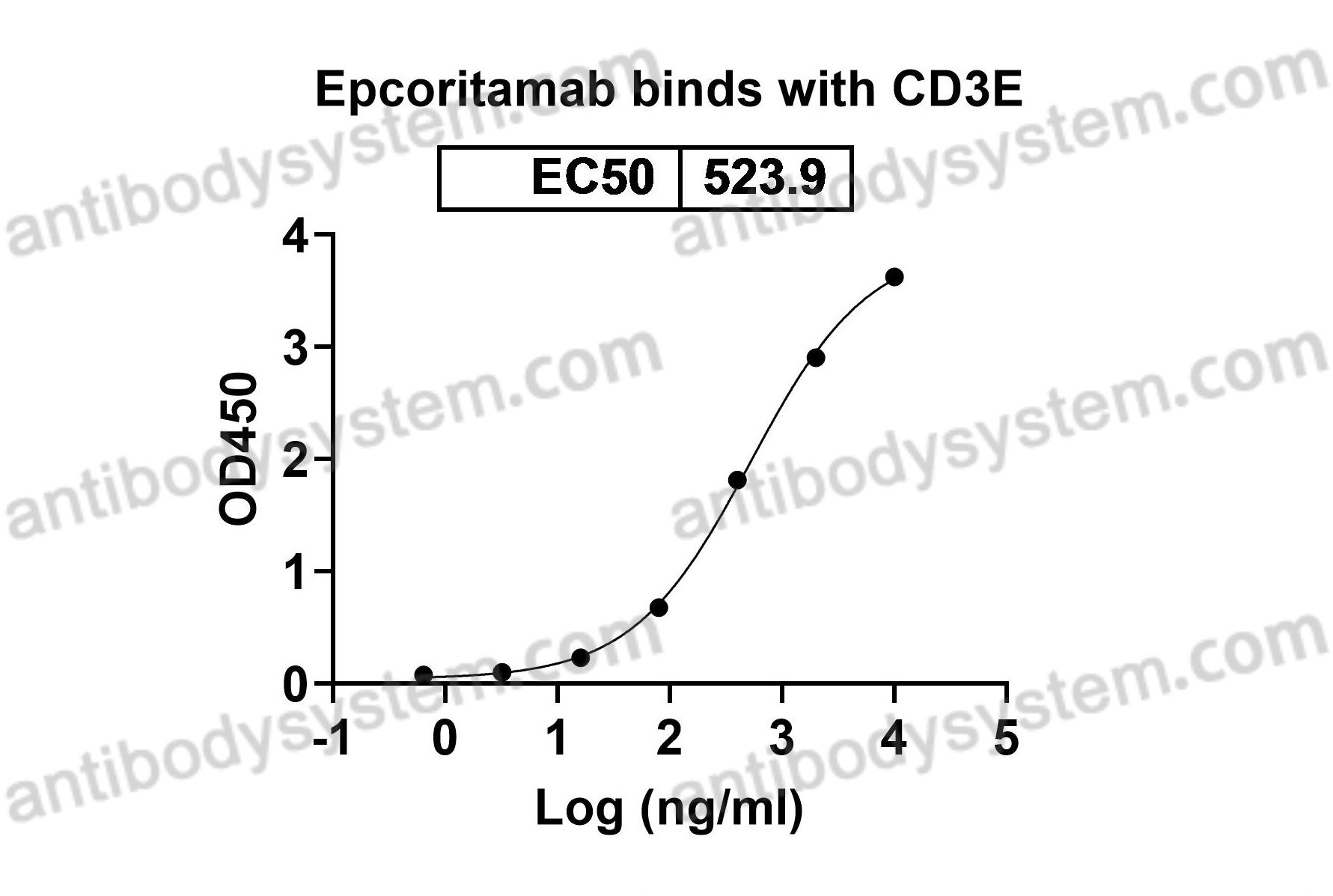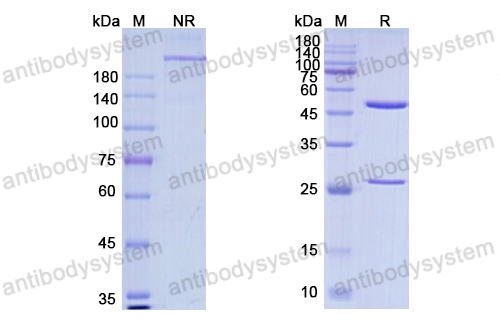Catalog No.
DHC90713
Expression system
Mammalian Cells
Species reactivity
Human
Host species
Chimeric
Isotype
Ig(G1-kappa_G1-lambda)
Clonality
Monoclonal
Target
B-lymphocyte surface antigen B1, Membrane-spanning 4-domains subfamily A member 1, MS4A1, Leukocyte surface antigen Leu-16, B-lymphocyte antigen CD20, Bp35, CD20, T3E, T-cell surface antigen T3/Leu-4 epsilon chain, CD3e, CD3E, T-cell surface glycoprotein CD3 epsilon chain
Concentration
3.9 mg/ml
Endotoxin level
Please contact with the lab for this information.
Purity
>95% as determined by SDS-PAGE.
Purification
Protein A/G purified from cell culture supernatant.
Accession
P11836 & P07766
Applications
Research Grade Biosimilar
Form
Liquid
Storage buffer
0.01M PBS, pH 7.4.
Stability and Storage
Use a manual defrost freezer and avoid repeated freeze-thaw cycles. Store at 4°C short term (1-2 weeks). Store at -20°C 12 months. Store at -80°C long term.
Alternative Names
GEN3013, CAS: 2134641-34-0
Clone ID
Epcoritamab
Epcoritamab induces potent anti-tumor activity against malignant B-cells from patients with DLBCL, FL and MCL, irrespective of prior CD20 monoclonal antibody treatment, PMID: 33602901
Chemotherapy-Free Management of Follicular and Marginal Zone Lymphoma, PMID: 34017197
Early Epcoritamab Administration Revives CAR-T Cells in Relapsed/Refractory B-Cell Lymphomas., PMID:40530258
Combinability of epcoritamab CD20-targeting T-cell engager and CD20 antibody-targeted therapies in B-cell non-Hodgkin lymphoma., PMID:40528731
Heavily Pretreated Refractory Diffuse Large B-Cell Lymphoma Successfully Treated with Epcoritamab: Case Report., PMID:40524964
QSP modeling of loncastuximab tesirine with T-cell-dependent bispecific antibodies guides dose-regimen strategy., PMID:40500294
Indirect comparison of epcoritamab vs chemoimmunotherapy, mosunetuzumab, or odronextamab in follicular lymphoma., PMID:40472301
CD20×CD3 Bispecific Antibodies in B-NHL: A Review of Translational Science, Pharmacokinetics, Pharmacodynamics, and Dose Strategy in Clinical Research., PMID:40471801
Efficacy and safety of epcoritamab in Japanese patients with relapsed or refractory diffuse large B-cell lymphoma: 3-year follow-up from the EPCORE NHL-3 trial., PMID:40434509
Case Report: Persistent COVID-19 in a fully vaccinated Japanese man being treated with rituximab and epcoritamab for diffuse large B-cell lymphoma., PMID:40370717
Time-limited reimbursement and Temporary Access Process for early access to oncology treatments in Canada: a perspective based on the epcoritamab experience., PMID:40273150
An evaluation of epcoritamab as a treatment for relapsed or refractory follicular lymphoma., PMID:40251963
Glofitamab results in cost savings versus epcoritamab in relapsed/refractory diffuse large B-cell lymphoma: a total cost of care analysis‡., PMID:40202060
Budget impact of introducing glofitamab for treatment of relapsed or refractory diffuse large B-cell lymphoma after two or more lines of systemic therapy in the United States., PMID:40163049
Utility of CSF IL-6 monitoring in managing ICANS associated with Epcoritamab treatment: a case report and literature review., PMID:40159285
Histological confirmation and radiotherapy facilitate continuation of epcoritamab in a patient with tumor flare reaction., PMID:40155558
Optimal Use of Bispecific Antibodies for the Treatment of Diffuse Large B-Cell Lymphoma in Canada., PMID:40136346
PMDA regulatory update on approval and revision of the precautions for use of anticancer drugs; approval of atezolizumab for alveolar soft part sarcoma, epcoritamab for follicular lymphoma, and isatuximab for multiple myeloma in Japan., PMID:40117081
Targeting the Immune Microenvironment in Chronic Lymphocytic Leukemia: An Evolving Therapeutic Strategy., PMID:40066747
[Epcoritamab monotherapy in refractory or relapsed follicular lymphoma after at least two lines of systemic treatments]., PMID:40011144
Antibody Therapy for Patients with Lymphoid Malignancies: Past and Present., PMID:40004173
Epcoritamab injection site skin eruption: a frequent yet unharmful effect due to a local delayed reaction mechanism., PMID:39998415
The Development and Application of Bispecific Antibodies in B-Cell Non-Hodgkin Lymphoma., PMID:39997328
Comprehensive analysis of adverse events associated with T-cell engagers using the FAERS database., PMID:39982395
Optimal Dosing Regimen for Epcoritamab, a Subcutaneous Bispecific Antibody, in Relapsed or Refractory Large B-Cell Lymphoma., PMID:39935086
New bispecific antibodies in diffuse large B-cell lymphoma., PMID:39911111
Epcoritamab-Induced fatal pleural effusion in diffuse large B-Cell lymphoma: a case report and literature review., PMID:39825138
The emergence of bispecific T-cell engagers in the treatment of follicular and large B-cell lymphomas., PMID:39820375
Severe dual fungal infection after bispecific antibody therapy: A case of invasive aspergillosis and mucormycosis in immunocompromised patient., PMID:39810812
Cytokine Dynamics in Action: A Mechanistic Approach to Assess Interleukin 6 Related Therapeutic Protein-Drug-Disease Interactions., PMID:39807804
Epcoritamab plus GemOx in transplant-ineligible relapsed/refractory DLBCL: results from the EPCORE NHL-2 trial., PMID:39792928
Population Pharmacokinetics of Epcoritamab Following Subcutaneous Administration in Relapsed or Refractory B Cell Non-Hodgkin Lymphoma., PMID:39708278
Metabolic pitfall of pseudoprogression after epcoritamab treatment., PMID:39691259
Structural insight into CD20/CD3-bispecific antibodies by molecular modeling., PMID:39674067
Antiviral combination treatment of SARS-CoV-2 after repeated treatment failures of remdesivir monotherapy: A case report., PMID:39634632
Bispecific antibodies for the treatment of hematologic malignancies: The magic is T-cell redirection., PMID:39617677
Treatment with epcoritamab in 10 patients in real-world clinical practice., PMID:39603633
A Case of Progressive Multifocal Leukoencephalopathy Caused by Epcoritamab., PMID:39552980
Bispecific antibodies in follicular lymphoma., PMID:39479864
Novel Bispecific T-Cell Engagers for the Treatment of Relapsed B Cell Non-Hodgkin Lymphomas: Current Knowledge and Treatment Considerations., PMID:39479221
The landscape of T-cell engagers for the treatment of follicular lymphoma., PMID:39398477
[Recent advances in the treatment of DLBCL]., PMID:39358300
Epcoritamab in relapsed/refractory large B-cell lymphoma: 2-year follow-up from the pivotal EPCORE NHL-1 trial., PMID:39322711
Safety and Efficacy of Bispecific Antibodies in Adults with Large B-Cell Lymphomas: A Systematic Review of Clinical Trial Data., PMID:39273684
Comparisons of treatment outcomes of epcoritamab versus chemoimmunotherapy, polatuzumab-based regimens, tafasitamab-based regimens, or chimeric antigen receptor T-cell therapy, in third-line or later relapsed/refractory large B-cell lymphoma., PMID:39152509
Pathological landscape of tumor flare reaction to epcoritamab treatment., PMID:39134865
The Evolving Role of Bispecific Antibodies in Diffuse Large B-Cell Lymphoma., PMID:39063920
Intratumoral T-cell composition predicts epcoritamab-based treatment efficacy in B-cell non-Hodgkin lymphomas., PMID:39006439
Practice efficiency and total cost of care with bispecifics and CAR-T in relapsed/refractory diffuse large B-cell lymphoma: an institutional perspective., PMID:38913826
Epcoritamab monotherapy in patients with relapsed or refractory follicular lymphoma (EPCORE NHL-1): a phase 2 cohort of a single-arm, multicentre study., PMID:38889737




